Why Ketosis Diets Will Fail: The Paleo and Keto Manifesto

The most disturbing trend in wellness these days is that most people have no idea what to eat.
When choices were fewer, 100 years ago, how to eat for good health was much clearer. Americans have been so steeped in diet fads that they’re now thoroughly confused about food.
What You Need to Know About Ketosis
In this article:
- Changing Diets and Fads
- New Fad: Low-Carb Ketogenic Diet
- Ketogenic Diet Skeptic
- The Diet Industry and Their New Fads
- The Calorie and Carbohydrate Restrictions
- Fasting for the Keto Diet
- Is a Low Carbohydrate Diet Good for You?
- The Vegan Diet
- Why the Keto Diet is Doomed
- Keto Quotes | Experts Challenge Ketogenic Myths
- Gerson Therapy | Nutritional Regimen for Cancer
- Reconsider Diet Fad-Hopping
- Diets for a Longer Life
Changing Diets and Fads
Recently, I mentioned to a millennial that when I was a kid, we didn’t have bottled water, and she said, with a shocked look on her face, “Then how did you get any water to drink?!”
Programmed Food Cults
Similarly, modern people think that in order to eat, you have to follow one of the diet fads. A strange feature of life in 2018 is the need to align with a programmed “food cult,” as I call them.
Thanks to some strange cultural and market forces I do not believe to be particularly helpful to our overall health, food has become much like religion.
Many don’t know how to eat outside of what their food tribe, congregation, or pastor tells them, and every few years, many people convert to the new cult.
“I’m Paleo,” people say—as if identifying with a coat of arms.
I’ve been asked countless times, “What diet do you eat?”
New Fad: Low-Carb Ketogenic Diet
Several years ago, I wrote a detailed blog post on why the Paleo Diet was a fad, wouldn’t last, and why it would eventually be supplanted by a new fad aggrandizing fat rather than protein.
Paleo followers wrote murderous emails and comments.
Now those same people, it seems, are rabidly promoting the Ketogenic Diet.
The Paleo Diet
I felt I was fair to the Paleo Diet. We were friends, to a point. At least the Paleo cult banned processed food, even while glorifying animal flesh foods and strangely vilifying entire classes of foods that hominids and humans have eaten for 3.4 million years:
Now, it seems, we’ve gone from the proverbial frying pan to the fire.
New Golden Child: High-Fat Diet
As I predicted would happen from many live stages on my lecture tours earlier in this decade, the new “golden child” in the diet industry is, predictably, fats.
It turns out over-eating protein saved us from exactly nothing. Following historical trends, then, a new diet fad must be born to instruct the Western world how to eat.
To clarify, fat isn’t really a “new” golden child. It’s a recycled golden child since Atkins already did it, and the Ketogenic Diet isn’t all that different from the famed Atkins Diet that many published studies showed was not beneficial to our health.
Ketogenic Diet Skeptic

Eating mostly meat can lead to many health and wellness issues
The least profitable foods—the ones that grow in the ground and on trees—are the least likely to get any significant attention from the food cults.
Paleo and Ketogenic Diet Failure
The most profitable foods (those in packages, made with “proprietary processes” and stamped with “Paleo Friendly” or “Keto Approved”) also have the lowest vibrational energy, the lowest micronutrient levels, the lowest fiber, and the lowest ability to prevent disease.
I’ve invited some of my friends—medical doctors, researchers, and authors who have watched the diet industry’s chokehold on the American diet with growing alarm—to weigh in on the latest fad now often called “Keto.” Their quotes are included in this blog post.
The Inevitable Keto Failure
I believe this latest ketosis diet will be chased off the stage by research that was already published at the end of the reign of the Atkins diet fad, along with additional research that's sure to come, all showing the overwhelming negative health effects of overeating animal products and repeatedly manipulating the body into a state of “ketosis.”
I also predict that five years from now, the same people advocating the “ketogenic diet” currently will be onto a new fad, promoting the new golden child instead.
The Diet Industry and Their New Fads
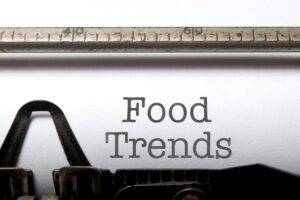
The diet industry is constantly changing and selling new ways to lose weight or be healthy
Here’s the thing: the diet industry is big business. Tens of billions of dollars a year. It’s in collusion with the packaged food industry.
These wealthy industries aren’t going anywhere, and they are a treadmill, needing a new fad every few years so they can replace “Paleo Approved” products with “Keto Approved” products and create the false need for more consumption.
Why Are There So Many Diet Plans?
The diet authors and processed food industries pivot, pose, and preen based on whatever is popular, not what’s actually good for human health.
Elimination Diets
The cabbage soup diet. The green smoothies diet. The werewolf (lunar) diet. The grapefruit diet. The tapeworm diet. The blood type diet. The apple cider vinegar diet. The cotton ball diet. The wheat-elimination diet. The alkaline diet.
The authors of some of these books are friends of mine. Good people.
And I’m not innocent. I wrote The Green Smoothies Diet, after all. (I threw that in the list, to be fair. Someone would have brought it up.) I’m willing to put my own book on the pileup to make an important point.
The Green Smoothies Diet
As a side note, though, may I share why I wrote that book? What I actually wrote wasn’t a “diet” at all. It was about how combining lots of superfoods and greens in a blender is an answer to our nutrient insufficiency, in an age where we want all our food to be “fast.” But the publisher insisted on naming it The Green Smoothies Diet. "Write whatever you want," they said, "but we WILL call it a 'diet,' and if you refuse, we’ll find another author to write it." That book has sold more copies than my other 14 books combined (which demonstrates the point: diet books sell).
The Big Business of Diet Fads
So, aggrandizing one food class, or one food, as if it has magical properties that will save everyone from every disease, is good for business.
Vilifying a class of foods, and teaching people how to avoid them, is big business, too, and fundamental to the diet industry.
To do either of these things, you generally have to cherry-pick data, ignoring a great deal of evidence to the contrary.
The Diet isn’t for Everyone
I play tennis competitively, and on the court recently, one of my tennis teammates was doubled over. It was only 9 am, so I asked:
“You seem really tired, what’s wrong?”
She said, “I’m on the ketogenic diet, and I’m exhausted. My husband just got really ‘shredded’ on it, but I don’t feel good at all.”
The Calorie and Carbohydrate Restrictions
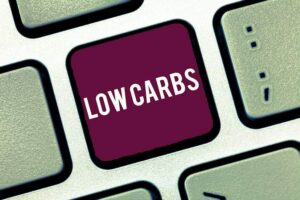
Cutting carbs from your diet is not a healthy or sustainable way to reach your health goals
You can lose weight in countless ways. Atkins, Ketogenic, you name it. They’re banning whole categories of foods, and they’ve all been shown, in studies tracking what the dieter actually eats, to be clever forms of calorie restriction.
(Many evaluations of the popular diets since Atkins have shown that since no one wants to eat unlimited protein or unlimited fats, dieters end up eating fewer calories.)
Low-Carb Diet
But the human body has lived on carbohydrates—70 percent carbohydrates, on average—since the dawn of time. It’s the food your liver requires.
Carbohydrates aren’t bad, just by virtue of being carbohydrates.
The talk about “carbs” is virtually meaningless, since most foods are high in carbohydrates.
Different Types of Carbohydrate Intake
You’ve got simple and complex carbs, whole-food carbs and refined-food carbs. You’ve got “carb” foods full of important soluble or insoluble fiber—or both.
You’ve got wonderful “carb” foods that are extremely high in micronutrients (hundreds of different vitamins, minerals, enzymes, phytonutrients)—and others that are worthless, and harmful, with virtually no micronutrients.
Shortcomings of Fat and Protein Intake-Only Diets
It should be noted that “proteins” and “fats,” though they have important properties needed for health, are almost always foods with little or no dietary fiber and very low micronutrient density as well. Since our gastrointestinal cancers epidemic is largely due to lack of fiber and micronutrients in the “standard American diet,” eliminating carbs seems a terrible idea for cancer prevention and treatment, especially when it comes to colorectal cancers.
Making ALL Carbs Look Bad
Truly, lumping all the foods containing “carbohydrate” into a single class makes little sense.
Because even if we narrow it down and look at two foods high in simple sugars as an example, a bagel and a banana are very different foods.
The Bagel and the Banana
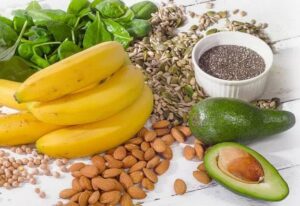
Bananas and bagels are both 'carbs'
The bagel is Roundup-sprayed (twice!), stripped of fiber and lacking any real micronutrients, gluey, and will slow your digestion. It has nothing to offer you besides a gluten reaction and a blood-sugar and insulin spike.
A banana, though, has soluble fiber and dozens of nutrients, including potassium and magnesium. It is a high-vibration food that contributes to longevity.
Calling both of these foods “carbs” is misleading—virtually useless, in fact.
The Danger of Restricting Carbs
Eliminating or severely restricting carbohydrates from the diet, as both the Paleo and Keto diets do, is especially problematic since foods considered “carbs” are the foods highest in fiber and micronutrients, which are linked, in thousands of studies, to reduced disease risk.
Fasting for the Keto Diet

Fasting is actually quite healthy for you; ketogenic fasting, however, is not
Fasting is part of the ketogenic diet, and fasting is a great idea.
However, to put the logical fallacy to rest: fasting is part of the ketogenic diet, and fasting is good for you, but that does not mean the ketogenic diet as a whole is a healthy, sustainable way to live or even a good way to lose weight.
Researched Benefits of Fasting
Fasting is well-researched and time-tested. Many cultures of the world have engaged in periods of not eating for physical purification as well as spiritual benefits, and many research studies show fasting to be beneficial for human health.
[Related Article: Will a Fasting Diet Give You The Results You Want?]
Fasting Problem with Ketosis
The benefits of fasting aren’t necessarily related to the state of “ketosis,” where starvation supposedly forces fat burn. (See Dr. Alan Christianson’s quote below about whether “ketosis” is even what the Keto diet claims it is.)
I’m far more interested in the induced state of autophagy from a 12-hour fast, or for a longer fast lasting several days.
I’ve water-fasted (no food, only water) for stretches of 7 days, 9 days, and 12 days in the past two years.
Why? Because in autophagy, when the body has no food, it scavenges aberrant cells and sends immune function into high gear, gobbling up cancer cells, yeast, mold, byproducts of metabolism—generally and specifically cleaning house.
Fasting for a Long Life
I believe fasting is one of the most powerful things you can do for longevity and to avoid chronic disease. Thomas Lodi, M.D., a Columbia-trained medical doctor, presents all his cancer patients with information on water fasting and tells them it’s the single most powerful thing they can do in their treatment.
Why Fasting Doesn’t Work with Keto
Compare that to the ketogenic diet plan, where you may be advised to drink acidic coffee full of butter alongside a plate of bacon. This is unsustainable, unpalatable, and artery-clogging, as well as devastatingly low in chlorophyll, oxygen, raw enzymes, phytonutrients, vitamins, and minerals.
Is a Low Carbohydrate Diet Good For You?
Let’s take a look at some of the myths around the diet industry’s theory that carbs make you tired, sick, and fat.
Ari Whitten and Wade Smith, MD’s book, The Low Carb Myth, says this:
“The Carbohydrate Theory of Obesity [an attempt to blame fat gain on carbohydrates and sugars] is based on numerous scientific inaccuracies, omissions of data, and countless instances of data cherry-picking.”
The Paleo Diet Do’s and Don'ts
One study showed the Paleo Diet to be most essentially defined, by its followers, as eating more vegetables. If that’s the case, we’re all friends here.
The Paleo Diet does ban white flour, processed sugar, and chemicals in your food.
Unfortunately, most people embracing it eat even more animal products (protein and fat) than the average American does, and that is an important note in pointing out the problems with the Paleo diet.
Banning Legumes, Fruits, and Grains
Legumes, fruits, and unprocessed grains have been part of healthy diets worldwide since the dawn of man 3.4 million years ago, as shown by recent research on early hominids at the University of Utah.
If you don’t want to eat legumes and whole grains, or if you’re reactive to legumes due to a damaged microbiome—fine, you can probably also stay healthy eating really clean forms of animal protein.
But keep in mind that it generally takes 20 pounds of plants to bring 1 pound of animal food to market.
The Vegan Diet
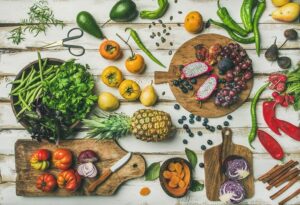
A vegan diet provides a number of health benefits many are searching for in other diets
If vegetarians and vegans make you angry (both Paleo and Keto diet proponents tend to be rather anti-vegan), check your thinking. Vegans may be dogmatic, and you may not like their style in promoting their diet, but their diet is using 5 percent of the Earth’s resources to sustain themselves, drastically less than someone eating the 30 to 60 percent animal proteins of the Paleo and Keto diets.
Less Damage to the Planet
Healthy vegans, the ones who eat whole foods as opposed to junk food, are living with far less impact on the planet.
Maybe you should thank a vegetarian today, even if you’re personally choosing to eat meat. The direction we’re driving the diet bus these days, with so many packaged foods and animal foods, isn’t sustainable ecologically.
Why The Keto Diet is Doomed

The ketogenic diet is not sustainable, for you or the environment
We can all be friends, and I love the Paleo Diet for getting people off processed food.
But Paleo’s new, sexy sibling, the Ketogenic Diet? It’s just bad news. It’s lipstick on a pig.
(Let the hate mail begin.)
And the worst of the bad are these people selling toxic jugs of “ketones.” Please don’t drink this plastic, petroleum-product garbage. It’s pure marketing, it’s not food, and it’s not good for you.
Scientific Warnings Against Ketosis
The Ketogenic Diet will eventually be run out of town by scientific studies of long-term results, just like all the others have. (Eat Right for Your Blood Type, Atkins, and Paleo come to mind.)
And in fact, the Ketogenic diet is so similar to Atkins that many experts have written entire books warning America that the excesses of animal products and the strange “ketones” phenomenon represent a serious threat to public health, based on volumes of published research.
Think of the Long-Term Effects
Use your critical thinking skills rather than sign on as a human guinea pig every time the diet and food manufacturing industries put a new spin on a tired, old debunked concept in front of you.
We already know what people eat to lose weight and keep it off. High-fat, bacon-and-eggs meals with coffee? That’s not it.
No Health Benefits
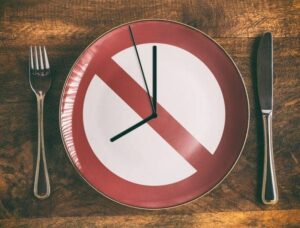
The Keto marketers have brought one of the worst, but most popular, diets in the history of diets (Atkins!), back to life. With a fasting twist.
Cancer survivor and nutrition researcher Chris Wark says, “The ketogenic diet is like fasting, only with none of the health benefits.”
With the ketogenic diet’s new obsession with “fasting,” diet marketers have taken something good and made it into something commercial and less-than-helpful.
Just Another Atkins Diet
In effect, Keto marketers have brought Atkins back from the dead, even though it's one of the worst diets in the history of diets.
The twist? It’s still bacon and coffee for breakfast, but this time, there's fasting!
Haven’t we evolved past this? If you eat for ketosis, plan to have constipation, bad breath, yo-yo weight loss and gain, and your liver breaking down, just like happened for millions of Atkins sufferers and Dr. Robert Atkins himself, who suffered from heart disease.
We already learned with the Atkins Diet that bouncing in and out of ketosis is a great way to end up heavier than you started, possibly with a new diabetes diagnosis.
Keto Quotes | Experts Challenge Ketogenic Myths
Ari Whitten and Wade Smith | The Low-Carb Myth
Ari Whitten and Wade Smith, MD, said, in their book, The Low-Carb Myth:
“….the notion of everyone eating diets of essentially nothing but fat and protein with only a tiny amount of carbohydrate as a widespread initiative to combat obesity is laughable, since any dietary pattern so extreme as to jettison an entire macronutrient (and simultaneously limit another one) is simply unsustainable for the majority of people.”
Harry Massey | Filmmaker
My friend, filmmaker Harry Massey, was convinced by a mutual friend of ours, one of the diet book authors, to try the new fad, and this is what he told me:
“I went on the ketogenic diet, I felt like crap, and three months later I was diabetic.”
I also did an interview with him on the Vibe Podcast, Ep.31: The Human Body Field with Harry Massey for more Harry Massey wisdom.
Dr. Joel Fuhrman | NYT Bestselling Author
Dr. Joel Fuhrman, MD, 4-time NYT bestselling author, joined me for Episode 37 of the Vibe Podcast, "Eat to Live," and shared these thoughts additionally with me about the ketogenic diet:
"There are many variations of the ketogenic diet, and some are more dangerous than others. One thing known without question is that the long-term safety of these diets is unknown, because studies would have to follow thousands of people for decades into their 70s and 80s to truly ascertain the true risks.W hat we do know with certainty from such long-term studies is that as the proportion of products from animal products increase in the diet, so does the death rate from cancer and heart disease.
"In other words, the quality and long-term safety of a diet can be determined by the ratio of 'produce' calories to 'animal product' calories. We also know that diets richer in antioxidants and phytochemicals—and with a broad variety of such anti-cancer immune-supporting substances—are critical to prevent later-life cancers.
"The ketogenic diet generally uses high amounts of oils, which do not contain a significant micronutrient content as a source of calories, thus diluting the micronutrient density of the diet.
"In summary, it is not the diet best designed to push the envelope of human longevity, though a ketogenic diet, if well designed, may not be as dangerous as the highly processed-food SAD diet, which contains dangerous ingredients such as white flour, sugar, fried foods, soda and junk food."
—Joel Fuhrman, MD
Dr. Alan Christianson | NYT Bestselling Author
I spoke at length with Dr. Alan Christianson, NMD, NYT bestselling author, in Episode 50 and Episode 121 of the Vibe Podcast. Here, he challenges the entire foundation of the diet:
“The ketogenic diet is a legitimate tool for helping reduce seizures among epileptic children who did not respond to medication. We may learn more in the coming years about benefits to other conditions, but most think of it as an easy path to weight loss.
“The underlying assumption people make is that the ketogenic diet makes them better at burning fat. Sadly, it does the exact opposite, and the confusion comes about from using the phrase 'burning fat' in two different contexts. Using fat for fuel is called beta-oxidation. Breaking down body fat is called lipolysis. Ketosis is the state in which your liver cannot burn fat for fuel. It can burn fat for fuel only when carbohydrate and protein are also present.
“A ketogenic diet only leads to lipolysis when it contains fewer calories than is needed. This is true of any diet. When a ketogenic diet has more calories than is needed, the extra dietary fat that is initially converted to ketones gets turned into triglycerides and stored as body fat.
“In a controlled human study comparing a ketogenic diet against a high carb, high-sugar diet with the same number of calories, the high-carb diet led to more fat loss than the ketogenic diet.
“Besides the lack of efficacy for weight loss, the ketogenic diet has risks to consider for those seeking to improve their health. The evidence supporting the benefits of dietary fiber, vitamins, and minerals, is undeniable. The ketogenic diet is devoid of fiber and low in vitamins and minerals.
“Along with a myriad of side effects like fatigue, diarrhea, muscle cramps, and headaches, people on ketogenic diets also run the risks of:
- hypothyroidism
- impaired athletic performance
“We may find more medical applications of the ketogenic diet and more ways to mitigate some of the inherent risks and deficiencies it creates. However, ketones are not the 'preferred' source of fuel for the human body, nor are they effective hacks for weight loss.”
—Alan Christianson, NMD
I collected more expert opinions on the trouble with keto diets (22 and counting!) which go into more detail than this overview.
Weight Loss Diet Rankings
When U.S. News and World Report ranked diets for nutrition and successful weight loss, the Paleo Diet ranked at number 32 out of 40, and Keto tied for dead last, at 39!
Keto Claim for Cancer
One of the most troubling aspects to the new diet fad is the claim that it will cure cancer.
When Dr. Charles Majors first began claiming that the ketogenic diet cures cancer, many experts demanded any longitudinal study with evidence of this. Not only did Dr. Majors fail to produce any, he also recently passed away. Of cancer.
Gerson Therapy | Nutritional Regimen for Cancer
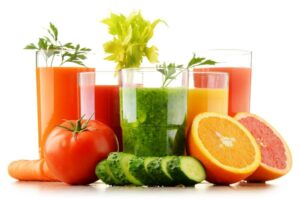
The Gerson therapy consists of an intake of juices from a wide variety of fruits and vegetables
As a counterpoint, the Gerson therapy as a nutritional regimen for cancer has reversed tens of thousands of cancer patients’ Stage IV cancer for 100 years now, and while it’s not a miracle cure, in this age of toxicity and far more virulent forms of cancer, it is based on legitimate concepts.
1. Fresh Greens and Vegetables
First, more than 10 glasses a day of fresh pressed green and vegetable juice floods the body with nutrients and oxygen to detoxify and rebuild immune function. (The ketogenic diet is high in fats, but very low in both fiber and micronutrients, as Dr. Christianson pointed out in the quote above.)
2. Carbohydrate-Rich Foods
Second, Gerson uses efficacious, non-toxic methods of breaking down and eliminating tumor tissue. (That’s glucose plus oxygen in the cells, using organic plant material in “carbohydrate” foods rich in every known anti-cancer nutrient: the effect is alkalizing and cancer destroying.)
[Related Article: Gerson Therapy: My Observations From a 20 Clinic Tour]
Reconsider Diet Fad-Hopping
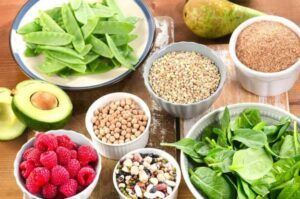
The “diet before diets” was heavily plant based—rich in greens, vegetables, fruits, legumes, whole grains, nuts and seeds.
I hope you’ll reconsider jumping on every bandwagon each time a new fad diet comes out.
Original Plant-Based Diet
The “diet before diets” was heavily plant-based (as opposed to vegetarian or vegan, which implies no animal products, ever) rich in greens, vegetables, fruits, legumes, whole grains, nuts, and seeds. Healthy people from all over the world, as documented best in the Blue Zones research, ate quite widely varying diets based on what was available in specific geographic areas.
But all of the Blue Zones eat a heavily plant-based diet, and two of them eat virtually no animal protein at all.
Dr. Joel Kahn | Wayne State Clinic
Here's another quote by cardiologist Dr. Joel Kahn, MD, Wayne State Clinical Professor of Medicine and guest in Vibe Podcast Episode 140:
“While ketogenic diets prompt the production of ketone bodies as fuel and are of proven value in rare cases of refractory epilepsy, they are also associated with data in several studies suggesting they boost the long-term risk of premature death. I would not advise the daily use of a long-term ketogenic strategy based on animal product consumption.”
Diets for a Longer Life
If we must attach a name to the “diet” associated with health and longevity, the plant-based and Mediterranean diets are the only ones that consistently show long-term positive outcomes, across thousands of published studies.
Dr. David Katz | Yale Meta-Study
The 2013 Yale meta-study under the direction of David Katz, MD, reviewed over 10,000 published studies in the field of nutrition over the course of the past decade and concluded that the most consistent finding is that eating more plants prevents disease. I've spoken with him on what true health means and how to get there in Episode 90 of the Vibe Podcast for even more valuable information.
Plants vs Meat Diets
Both the Paleo and Keto diets, the way that most people follow them, have people eating even more animal foods than in the Standard American Diet.
Primarily plant-based diets are what the vast majority of people ate before there were “diets.”
Disease and Processed Foods
Of course, there has been a wide variety in the specific foods eaten by various peoples, based on their availability, for 3.4 million years of human history.
But degenerative disease was rare in cultures eating whole foods, including mostly carbohydrates, for the entire history of humans, until 100 years ago when the processed food industry was born and the diet industry followed right behind it.
Do you have more questions about the keto and paleo diets? Do you want to know more about a diet with whole and unprocessed foods? Feel free to leave your questions in the comments section below.
Up Next: I Went Fasting Without Food for 40 Days | Here’s What I Learned

Disclosure: This post may contain affiliate links that help support the GSG mission without costing you extra. I recommend only companies and products that I use myself.
Editor’s Note – This post was originally published on January 3, 2018, and has been updated for quality and relevancy.
Posted in: 12 Steps To Whole Food, Eco Friendly Living, Health Concerns, Lifestyle, Whole Food




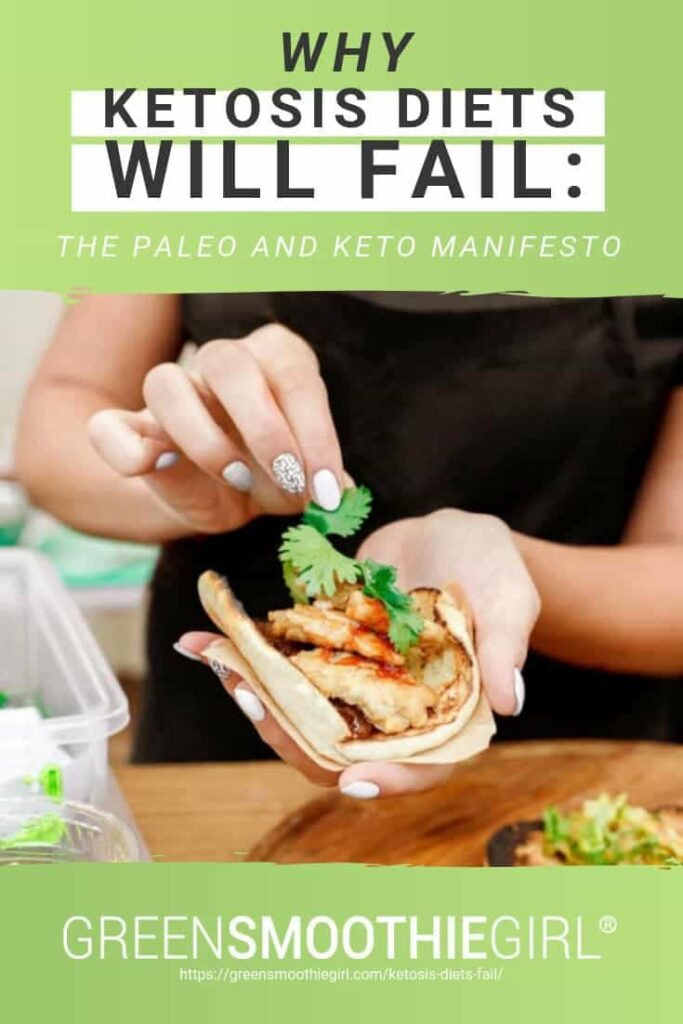









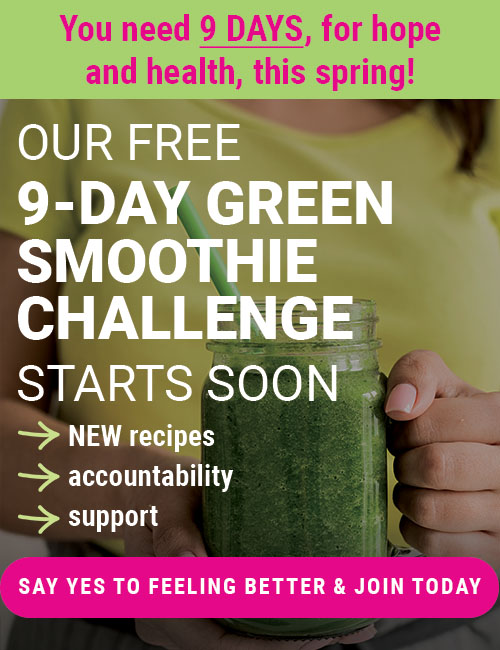
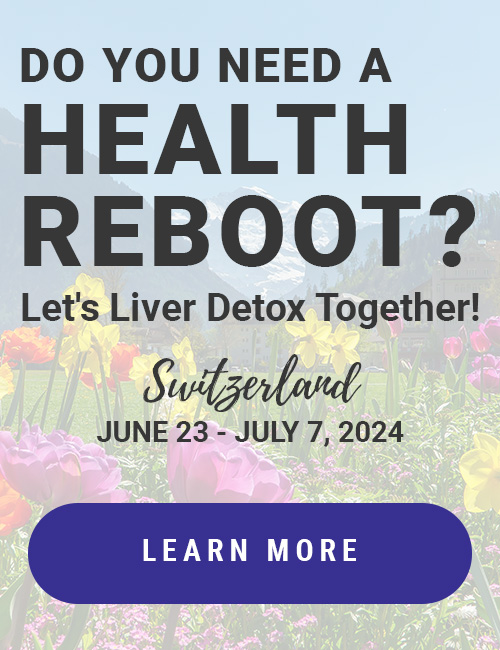

I just read this article and was a bit surprised. I was under the impression that the Ketogenic diet was successful by encouraging consumption of green leafy vegetables, low sugar fruits such as avocados, cucumbers and bell peppers and natural fats such as nuts and coconut oil; while discouraging all grains, high sugar fruits, and especially all processed foods with flours and added sugars. I must be getting my diet plans mixed up.
Ian, did you read the part of my article where I point out the things that are positive about Paleo and Keto….that ONE Paleo study showed that the #1 thing that people say that the diet is, for them, is “eating more vegetables?” However, the diet itself, and the way people practice it, while getting people OFF processed food, also gets people ON far more animal foods. This isn’t just bad for animals themselves, and the sustainability of our practices living on the planet–but it’s also bad for our health. Eating more vegetables is good. (But that’s not necessarily specific to Keto.) The ketogenic diet bans carbohydrates, and massively increases the amount of fats in the diet–that’s what it’s known for, not for being vegetable centric, though some people eating it do eat some vegetables.
Robyn, please do not tell people that the ketogenic diet bans carbohydrates. That is simply not true. The ketogenic diet limits carbohydrates. That is a BIG difference.
yes. but the authors of the various iterations of these diets vilify really healthy classes of whole foods, and you’re not supposed to eat fruits, legumes, whole grains (even organic, gluten free)…..and that’s tragic. because the evidence shows clearly that these are a critical part of a disease preventative diet. the carbohydrate restrictions are EXTREME. and almost every healthy culture in the history of man has eaten an average of 70 percent carbohydrate. so the diet makes no sense on any logical level.
Again, you are not being truthful. The following fruits can be part of a ketogenic diet: avocados, blueberries, coconuts, olives, tomatoes, blackberries, cranberries, lemons, limes, raspberries and strawberries. Some other fruits and starches can be eaten on on carb-up days.
I am disappointed in your lack of knowledge about the diet you are criticizing.
Robyn–so much you gloss over or ignore. The grains people ate 1000’s of years ago have nothing to do with the grains available today. Even 19c grains were different. For example wheat got bred in the mid-20c to contain higher levels of gluten. Historically wheat had about 2% gluten; it was bred to contain 35% gluten to appease the needs of commercial bakers. We now have concerns about arsenic in almost all rice due to chemicalization of big ag and fallout from factory wastes expelled into the air. China is a horrible example of what happens when industry has no environmental regulations. We now also have the consequences of Fukushima which is still spewing massive amounts of radioactive wastes into the air and water and we, in the US, are distinctly toxified by this. It is in the water and soil and so is affecting our food. The Korean cook who gave a class yesterday spoke of eating rice 3x/day. Out of this concern for arsenic she washes her organic rice, soaks it overnite, and washes it another 6 or 7 times before cooking. And she annually has herself tested for arsenic levels, such is her concern. Mine is to not spend so much time messing with a single food so I am quite happy to not eating it, or wheat, or most grains. I feel better without them, too. Even beans, which I normally liked, have been getting ignored much to my feeling better without them. I am finding that increasing healthy fats is much more satisfying, and cuts thru the sugar cravings.
It does seem there is a relationship betw carbs and fats in how our body feels when eating and the sustained energy we derive from our foods. A great green salad with minimal fat does not stay with me very long where more avocado or eggs or olive oil does.
Thank you for this information! I agree and hope we are all moving towards whole, unprocessed foods. With an emphasis on fruits and veggies.
However, how do we know it’s not an increase in toxins that has contributed to our health issues over the past 100 years? I’m curious.
Kristen, I think there’s a huge possibility that 80,000 chemicals approved for use in our environment are a BIG contributor to our illness. Those are hard factors to isolate for, since where there’s one chemical, in human tissues, there are hundreds. Those studies are emerging, and there’s pretty clear evidence that a lot of the chemical toxins have made us sick. But the #1 finding of the Yale meta-study run by David Katz, MD, was this: eating plants prevents disease. If you read 2015’s How Not to Die, by Michael Greger, MD, there are 35 pages of references at the end, all with this clear conclusion: if you want to die, of any of the diseases he reviews, chapter by chapter, in the book–eat more animal products.
So, while chemical toxins isn’t the topic in THAT blog post, I’ve written a LOT on that topic….and it’s a culprit, too!
Dr. Atkins died obese and of a heart attack, you think people would realize by now that low carb high fat diets aren’t the way nature designed us to eat. They are an artery clogging disaster! Thanks for posting this and sharing the message.
Atkins did not differentiate the quality of the food he promoted in his diet. And I don’t think he followed it himself very well. Why? That is more to my questioning than what killed him
We cured my husbands stage 4 Amelanotic Nodular melanoma using the ketogenic diet, which has shown to be the only diet effective in controlling epilepsy and has been used for this for over 100 years. So much for it being a fad diet. I have other people who have also revered their cancers using the ketogenic diet. It is effective in reversing early stage Alzheimer’s, heart disease and type 2 diabetes.
I realise you have an agenda to push your diet and book to earn money.
As for Dr Christiansen and Ari Whitten they slate and are extremely condescendingly derogatory about anything that does not comply with their agenda, so much so that I do not bother to listen to them any more.
The ketogenic diet has also shown itself to be very good for high performance athletes and and is advocated by Professors not mere doctors who slate it.
When my husband was on his Ketogenic diet, His NHS Doctor insisted on blood tests, hoping to prove that Keto was damaging. He was sadly disappointed when my husbands tests came back well above average. Done correctly it is definitely not deficient in anything. He also has more energy at 68 than most young people in their 20’s, He worked as a Chief engineer on Superyachts and out performed all the young crew is mental and physical ability and endurance.
Paleo is also alive an well, sorry to tell you and as plants are so full of Lectins, Phalates, Oxcalates, Phenols and other nasty toxins to the human one must ask if a plants based diet is really that healthy?
Not according to many researchers
hi, Ethel–yes, as I said in the article, those overcommitted to one of the fad diets, will hate my post.
By Phalates, do you mean Pthalates, which come from plastics? Or Phytates, which are an anti-nutrient in grain? (People ate grains as early as 3.4 million years ago, see the link to the University of Utah study I link to. Most paleolithic cultures ALSO ate grain.) Anyway, lectins in legumes, oxalates in greens, etc, are not “nasty toxins.” Not even close. I’m really sorry someone has convinced you of this. There is a growing body of evidence that these “anti-nutrients” in many classes of whole foods have important functions, and literally over 10,000 published studies (best source: Katz MD’s Yale metastudy, 2013) show that these foods–the ones containing goitrogens, oxalates, phytates, lectins, and more–are the very foods rich in micronutrients and high in fiber that prevent disease. Just because someone ate high in fats and is still alive, doesn’t mean it “cured” anything. While that makes a disease patient angry, because they want to believe that the fad they attached themselves to, cured their disease, there is a huge body of evidence that will challenge anyone’s thinking who follows the 20-60 percent animal products diet industry. I’d suggest several books you might read, but you’ve already dismissed Christianson and Whitten, so I’ll not bother.
I don’t have an “agenda” to “push a diet or book,” since my whole point is the anti-diet….just eat what people ate for thousands of years, before we had 40-50% of us getting cancer….but I AM interested in helping people realize that the fad diets aren’t in alignment with our wishes to be disease free.
Oh wow! Thank you Robyn for your comments, the post and your knowledge. These fad diets are just that. I have severe infections all through my body due to a bladder mesh. 9 years of this crap and honestly the only thing that ever helps is eating what people have eaten for years and also staying away from the pharmaceutical cash cows. Your spot on about the cancer. Diseases have become much more prevalent from what we ingest and what is now considered the,” norm” for Americans. Society in America has become lazy in our ways of much more than food. Interesting how eating the same way as it has been from the beginning has been a constant and never a fad.
Enjoyed your article Robyn. I have been having green smoothies for about 8 years now, although slacked off this last year and could feel the difference in my joints and skin etc. But back into my smoothies now. I tried eating more healthy fats….MCT oil and butter etc and put weight on. I grow most of my own fruit & veges and we catch our own fish. I find if I eat bread or other processed carbs early in the day I am done for….crave more. I find eating lots of fresh fruits & veges, a little meat or fish, good fats like avocado, coconut oil & a little olive oil on salads suits me best. I love not eating until lunchtime but do enjoy a black coffee about 10 am. My ambition is to fast for 7 days a couple of times a year for autophagy…to get rid of old and diseased cells. I am 65 and live at the seaside in Tasmania Australia where the air is so clean and we grow great veges….I believe that good nutritious food, clean air and clean water, exercise, plenty of sleep and fasting is the way to good health. I had an older lady a few years back, she was Asian, standing next to me at the markets in Qld, and she said ” you are very healthy ” which was the best compliment a person could ever have. I gave her a hug. I didn’t know her or know why she said it, but she must have sensed something !! I put it down to my green smoothies and all the superfoods like spirulina and chlorella etc that I put into them with lots of greens and fruits.
If you have intestinal fungal overgrowth, however, you will be encouraged to follow a low carbohydrate diet as well as denying yourself sugar, since candida and other fungal organisms are fueled by sugar, whether cane sugar, beet sugar, corn sugar or the sugar your body turns carbohydrates into. Some of these diets are so stringent it’s a wonder anybody survives on them, particularly when experiencing the die-off symptoms from killing fungal organisms.
Marjorie….yes, I agree. I answered another commenter, here, earlier today–saying the same. You’re really going to have to starve candida overgrowth with VERY low carbs. Which won’t make sense, as a disease preventative diet….but meat/eggs is going to be necessary for someone starving out yeast, because otherwise they won’t get enough calories while eliminating fruits, legumes, grains, and even starchy vegetables. Completely agree with you.
I am grateful for this clarification by Robyn. I was beginning to think maybe we should be doing all this paleo and keto stuff but not wanting to. It just didn’t make sense. I learned to cook 45 years ago by Japanese teachers promoting a macrobiotic diet. Unprocessed whole foods, WHOLE grains of every sort, vegetables and some fruit- foods from your own locality. Oranges don’t grow in Michigan in winter or summer for that matter so we didn’t eat them. Orange juice was not part of our diet because it was “good for you.” We ignored all that thinking. Legumes, beans, nuts and seeds were all a part of my everyday cooking. We did not eat animal food except for special holidays with family. No white bread, white flour products, junk food or sugar.
(To this day I buy a 2# bag of sugar once a year – because someone else will be here and wants to bake.)
Nor did we use dairy as a sustitute for meat or in cooking. It was occassional festive food, not the main food. I ate yogurt once every 6 months. Fiber and lack of toxins, pickles, & miso provide good intestinal flora. My husband and I were healthy, lost weight and raised our kids this way for the first 10 years of our marriage. After floating around with the average American diet, some of the fads and other things (Protein Power etc) we are back to whole grain eating as our base. I just made a soup with great northern beans and chopped vegetables. A cooked pot of farrow is ready to eat with veggies. Supper will be couscous (yes processed – gives variety )with chick peas, carrots, onions and celery in a sauce along with steamed fresh broccoli.
While some may have initial success on paleo, keto, etc it is most likely the change in relation to what they were eating that was processed, commercial and probably junk. hence improvement shows up. Those diets are not sustainably healthy. I agree with Robyn. The majority of the world has eaten plant based. When they change to more processed foods, they begin to get Western diseases. I am sticking with plant based.
I am all for you Robyn. Seeds, nuts, whole grains, vegetables, fruits, good healthy fats, pure water. fresh air,
sunshine and plenty of exercise will do the trick. Eating God’s Genesis 1:29 diet is what we need, not all
these money making diets. Keep it up maybe it will wake up this blinded world. I will be praying for you.
I agree with Paul and others above. Regardless of what you think about these other diets Robyn, the way you present your OPINIONS make a Hugh difference in how you are perceived. I think you are doing a lot of good for people, but I find that you come across in a self righteous and biased way. You cast aspersions on these other way of eating without objectively listing the pros and cons. Not everyone can eat unlimited amounts of fruits and starchy carbs and that’s not to say that these foods are bad. They certainly are not, but in my study of nutrition, it is always stressed that everyone is different and what works for one may not work for another. I think you would do well to present that fact.
Hey Cheryl–it’s an editorial, rather than a pros/cons sheet. I don’t think that a 60% animal products diet is good for anyone. So, I feel strongly enough about this subject to write a “manifesto”–clearly from the comments, it’s as polarizing as I assumed it would be, people either loving or hating it. I stand behind it, and there’s no ad hominem attacks or anything else that’s inappropriate–just an opinion and supporting quotes and studies that some like and some don’t.
Robyn kicked some ass in this article. Great article, Robyn. If your diet is not plant based, you don’t know what the hell you are doing. Keep up the good work, Robyn.
Just want to point this out to you: The fact that people disagree with you don’t make hem haters. I have no hate for you here, but I totally disagree with you and your sources are not very credible..
Ana, you can totally disagree with me. But, some of the emails I received (and some of the comments that were on this article, until we removed them) weren’t just hate–they were abuse. I’m not lumping in “those who disagree” with “haters.”
It seems to be an important truth that some people will always go on destructive attacks against anyone that disagrees with some belief system or other. Religion is not the only belief system that we hold and food is a big one for people. When people feel their belief system(s) are threatened they can become pretty nasty. It is called Cognitive Dissonance.
The other side of the picture is trolls who stalk the internet. Some of them are actually paid to create disruption; some do it out of ignorance for how they are being duped and used. While there is dynamic discussion here on this article, people need to understand there is a huge and well paid effort by industry to destroy anything holistic. To date there have been 80 deaths of holistic doctors in the past 3 yrs approximately. These are all suspicious deaths, often of fairly young people. Some of these deaths have been violent. People have a hard time taking in this nefarious component of this country, but it is not new and is quite vicious. One only has to think of the assassination of Kennedy!
Bravo to you, Robyn! No tomato throwing going on here. You are spot on! Thank you for your honesty and evidence based comments.
Having read several comments below, I’d like to tell you, Robyn, I appreciate your concern for people in general, but especially those of us who care about how we eat and want to, not necessarily live LONGER, but as long as we live, live healthy lives. One can be friends with those with whom we disagree when we are polite and caring. You point out that many on the “other side” are friends of yours. Our own daughter, nearly 40 years old now, decided to go vegetarian, but in a militaristic way, forcing her beliefs on her husband and children. Having been praying for her for some time, she has mellowed; she will eat whatever is served her, but when she has the choice, will not eat meat. What a lovely attitude. Keep up the good work, informing and encouraging us all!
Juliana, that’s funny, because my own 22-yo daughter, was a “militant” vegetarian 10 years ago. She’s STILL a vegetarian. But in high school, she said to me, “I argue with people all the time about vegetarianism at school,” and I said, “How’s that working for you? Converted anyone yet?” She said, nope. Now she just models it rather than argues, and shares resources for anyone who is open or interested. She’s enjoyed more success as an evangelist since softening quite a bit. She said to me, in that conversation back in high school, “You’re converting people to vegetarianism and you aren’t even one!” (I don’t actually preach vegetarianism….I try to leave more wiggle room than that, not just in what I teach, but ALSO in what I, personally, eat!) So, I couldn’t care less whether someone wears a label of vegan or vegetarian….but I feel passionately that we need to educate more people about how eating MORE plants is key, in avoiding all these modern diseases taking us all down.
I think the “militant” and controlling stance of many, in the vegan movement, actually cuts the other direction, and sends people packing.
No brickbats from Estrella! I’m just finishing off a fabulous green smoothie with banana and mango (really hot summer time in Oz, the bananas and mangoes are ON!). What you have said all along about the good stuff to eat is common sense, really, and the science also backs it AND it feels great, like putting high octane fuel into your tank! I don’t have to think about the ten squillion diets that are out there any more, it is so restful to simply let them pass me by, wooohoooooo!
Thank you Robyn for always being the calm voice of reason